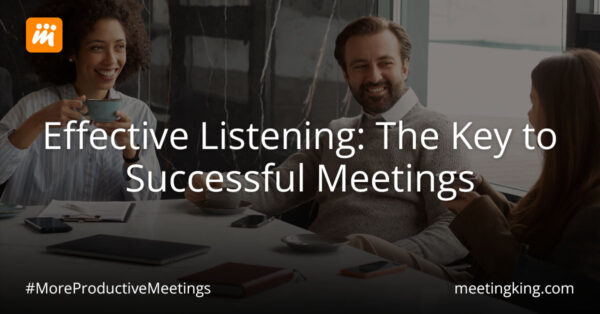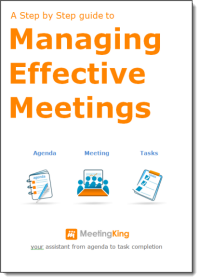
Effective communication is vital in any workplace, and meetings play a crucial role in ensuring that communication is clear, concise, and productive. However, effective communication is not just about speaking your mind; it is also about listening to others. Mastering the art of effective listening in meetings is a key ingredient to success.
In this blog post, we would like to share an overview of the advantages of effective listening, what a good listener looks like and what are some common barriers and how to overcome them to become the master listener in meetings.
The Benefits of Effective Listening
Effective listening in meetings has several benefits in the workplace. When you listen attentively to your team members, you:
- Avoid misunderstandings: Misunderstandings are common when communication is poor. Active listening helps prevent any confusion by ensuring that everyone is on the same page.
- Gain insights and ideas: Active listening allows you to learn from your colleagues and gain new perspectives, leading to better decision-making.
- Build stronger relationships: Listening to your colleagues helps you understand their perspectives and builds trust, leading to stronger relationships and better collaboration.
- Motivational: when you listen the other person feels that he or she is appreciated and makes a difference.
- Facilitate conflict resolution: By actively listening to all sides of a situation, you can better understand the root of the conflict and work towards finding a mutually beneficial solution.
The Characteristics of Good Listeners
Good listeners possess certain characteristics that make them effective communicators. They:
- Pay attention: Good listeners focus on what the speaker is saying and avoid distractions.
- Ask questions: Good listeners ask questions to clarify their understanding and show that they are engaged.
- Provide feedback: Good listeners provide feedback to the speaker on what they say, showing that they are actively listening and encouraging further communication.
- Remain open-minded: Good listeners approach conversations with an open mind, setting aside any preconceived notions or biases. This allows them to fully consider the speaker’s perspective and gain a deeper understanding of the topic at hand.
Common Barriers to Effective Listening
There are several barriers to effective listening that you should be aware of, including:
- Prejudice: Prejudice can prevent you from truly hearing and understanding what someone is saying. People often have preconceived notions, biases, or already-formed opinions, which can lead to selective listening. This prevents them from being open to alternative perspectives, diverse opinions, or new information.
- Distractions: It’s easy to get distracted by your phone, computer, or other people in the room. However, it’s important to stay focused on the speaker.
- Physical barriers: Physical barriers, such as noise or a poor sound system, can make it difficult to hear and understand the speaker.
- Lack of interest: Sometimes, we just aren’t interested in the topic at hand or we may not value the opinion of the speaker.
- Language barriers: In a diverse workplace where individuals from different countries have varied accents and fluency levels, it may require extra effort to ensure accurate comprehension and avoid miscommunication.
- Multicultural teams: Varying cultural backgrounds can impact how information is conveyed and received. Differences in non-verbal cues, norms, and expectations may require extra effort to understand and interpret messages accurately.
Overcoming Barriers to Effective Listening
To overcome these barriers and become a better listener, you can:
- Check your prejudices: Be aware of your biases, cultivate an open mind, and embrace a willingness to consider different viewpoints. This involves actively questioning your own assumptions and suspending judgment, and engaging in empathetic listening.
- Eliminate distractions: Turn off your phone and close your computer during meetings to minimize distractions.
- Address physical barriers: If there are physical barriers to effective listening, such as noise or a poor sound system, address them with the meeting organizer.
- Find value: Find something of value in what the speaker is saying, even if it’s just a different perspective. Try to actively engage with the speaker by asking questions or providing feedback. You never know when you might learn something new.
- Adapt communication strategies: Give full attention to the speaker, allowing for adjustments in understanding when encountering diverse accents or language proficiency levels. Seek clarification when needed, and demonstrate patience and respect. Maintaining an open mindset can foster effective listening and bridge language gaps.
- Foster an inclusive and respectful environment: Actively listen to different perspectives, encourage open dialogue, and embrace cultural diversity. Seeking to understand and appreciate the unique viewpoints and experiences of team members can enhance effective communication and promote successful collaboration.
In Summary
Effective listening is an essential skill for success in any workplace. By developing good listening skills, you can build stronger relationships, avoid misunderstandings, gain new insights and ideas, and motivate your team.
Remember to pay attention, ask questions, and provide feedback, and be aware of common barriers to effective listening. By doing so, you can become a better listener and make your meetings more productive and effective.
__
The image above by Freepik


